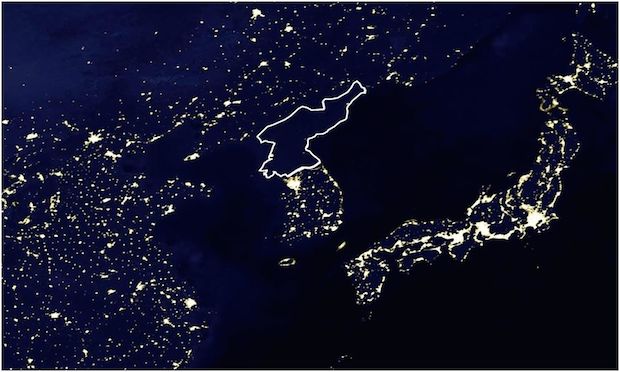How Do You Solve a Problem Like Korea?

Clearly not by launching a massive surprise attack on its military, followed by a massive ground invasion and occupation. That should go without saying, but apparently it needed to be said, so thank-you, Daniel Larison, for saying it. But is there anything we actually can do?
Well, let’s think backward from the end-game, which is a reunified Korean peninsula. If the North Korean regime fell, it would be hard for South Koreans not to want reunification, but the costs would be staggering – much higher than the costs of German reunification. So it would behoove the South to take its time. Stabilizing the North in the meantime, and preventing a massive refugee exodus, would require the help of the Chinese. China is also going to have strong opinions about the orientation of any successor regime in the North – they are not going to tolerate American troops on the Chinese border.
So getting to this end-game is going to require getting China comfortable with it. At a minimum, what I would imagine that would require is committing that a reunified Korea would be non-aligned (formally allied neither with China nor with America and trading freely with both) and denuclearized. That might not be enough – and if it isn’t, there’s probably nothing more we could offer. But perhaps it would. Perhaps China would see that as a net win – replacing a troublesome ally and a dangerous American bastion in Asia with a formally neutral, much more powerful country that would quickly become Finlandized. If they saw it that way, perhaps the Chinese, who have some influence with North Korea’s military, might be in a position to use that influence at a critical juncture in the future to neutralize the Kim family, and create some kind of opening.
I’m speculating wildly – and frankly, I don’t think there is much we can do to help North Korea; I don’t think China is likely to be helpful, and I wonder how helpful they actually could be (and perhaps one reason they wouldn’t be helpful is that they don’t want to reveal how little influence they actually have). But my basic point is: while China may not be capable of facilitating a positive change in North Korea, they are certainly capable of preventing one by shoring up the existing regime. So if there is any possibility of positive change, it still matters whether we convince China to be cooperative.
Earlier this week, there was some discussion in this space about the whole “credibility” argument, and I made the point that it would be more logical for credibility to be a concern for advocates of restraint – because if credibility is fragile then we should be wary of making commitments. But there’s another way in which credibility matters enormously from the perspective of advocates of restraint – and that is: America’s credibility when it promises to be restrained.
Let’s say that America approached the Chinese in secret to say something like the above: a promise that, if China helps ease the way to a reunified and democratic Korea, that America will withdraw its troops and unwind its formal alliance with the new country. There might be any number of reasons the Chinese wouldn’t bite – but a big one is, they would find our promise to be not credible. After all, we promised not to expand NATO into former Soviet territory – and then we did. We promised that NATO was a purely defensive alliance – and then we used it to prosecute non-defensive wars in Kosovo and Libya. Why wouldn’t China simply assume that we would renege on any promise we might make to them regarding the Korean peninsula?
I know I wouldn’t trust us. Why would the Chinese?
Pascal-Emmanuel Gobry wants to solve an awful humanitarian problem. That’s admirable. He is blithe about the likely massive humanitarian costs of aggressive war. That’s unconscionable. But he’s also blind to the ways that the kind of behavior he’s encouraging – America’s easy resort to unilateral exercise of military power – is one of the reasons why the North Korean regime still has a powerful friend like China.
Of course, a Finlandized but united Korea might not be as free as South Korea is today. Maybe it’s better to be under the American umbrella than to be neutral. I’m not sure that’s true – but posit that it is. And weigh that loss against the gain for the poor people of North Korea. It’s not a close call, is it? But I imagine very few advocates of aggressive action to save the North Koreans would see it that way. Why would that be?
Maybe because the actual humanitarian outcome is less important than playing the part of the savior.
Comments